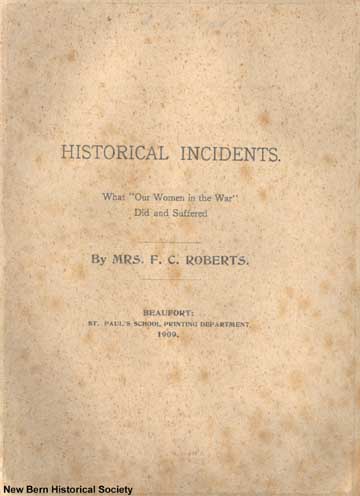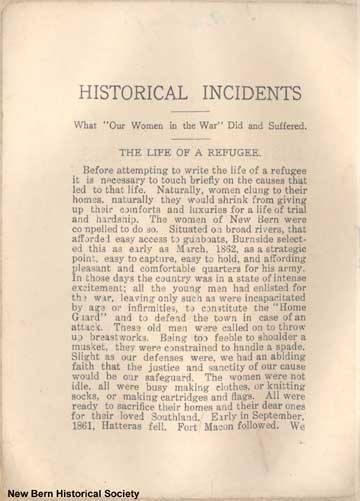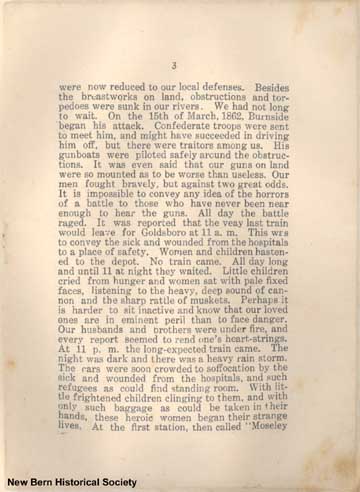
Historical Incidents by Mrs. F.C. Roberts
Title: Historical Incidents: What "Our Women in the War" Did and Suffered
Creator: Roberts, Lavinia Ellis Cole (Mrs. F.C.)
Subjects: North Carolina--History--Civil War, 1861-1865
North Carolina--History--Civil War, 1861-1865--Women
North Carolina--History--Civil War, 1861-1865--Personal narratives
Description: Personal narrative of the life of Mrs. Roberts during the Civil War describing the daily life and hardships she faced.
Date: 1909
Type: Text
Format: 14 pages
Identifier: NB.86.30.1
Source: Donation.
Coverage: North Carolina
Rights: Permission to use this resource must be obtained from the New Bern Historical Society, 512 Pollock Street, New Bern, NC 28560.
Click on the page images to view a more detailed image.
 |
HISTORICAL, INCIDENTS. What "Our Women in the War" By MRS. F. C. ROBERTS. BEAUFORT: ST. PAUL'S SCHOOL PRINTING DEPARTMENT. 1909.
|
||
 |
[p. 2] HISTORICAL INCIDENTS What "Our Women in the War" Did and Suffered. THE LIFE OF A REFUGEE. Before attempting to write the life of a refugee it is necessary to touch briefly on the causes that led to that life. Naturally, women clung to their homes, naturally they would shrink from giving up their comforts and luxuries for a life of trial and hardship. The women of New Bern were compelled to do so. Situated on broad rivers, that afforded easy access to gunboats, Burnside selected this as early as March, 1862, as a strategic point, easy to capture, easy to hold, and affording pleasant and comfortable quarters for his army. In those days the country was in a state of intense excitement; all the young men had enlisted for the war, leaving only such as were incapacitated by age or infirmities, to constitute the "Home Guard" and to defend the town in case of an attack. These old men were called on to throw up breastworks. Being too feeble to shoulder a musket, they were constrained to handle a spade. Slight as our defenses were, we had an abiding faith that the justice and sanctity of our cause would be our safeguard. The women were not idle, all were busy making clothes, or knitting socks, or making cartridges and flags. All were ready to sacrifice their homes and their dear ones for their loved Southland. Early in September, 1861, Hatteras fell. Fort Macon followed. We
|
||
 |
3 were now reduced to our local defenses. Besides the breastworks on land, obstructions and torpedoes were sunk in our rivers. We had not long to wait. On the 15th of March, 1862, Burnside began his attack. Confederate troops were sent to meet him, and might have succeeded in driving him off, but there were traitors among us. His gunboats were piloted safely around the obstructions. It was even said that our guns on land were so mounted as to be worse than useless. Our men fought bravely, but against two great odds. It is impossible to convey any idea of the horrors of a battle to those who have never been near enough to hear the guns. All day the battle raged. It was reported that the veay last train would leave for Goldsboro at 11 a.m. This was to convey the sick and wounded from the hospitals to a place of safety. Women and children hastened to the depot. No train came. All day long and until 11 at night they waited. Little children cried from hunger and women sat with pale fixed faces, listening to the heavy, deep sound of cannon and the sharp rattle of muskets. Perhaps it is harder to sit inactive and know that our loved ones are in eminent peril than to face danger. Our husbands and brothers were under fire, and every report seemed to rend one's heart-strings. At 11 p.m. the long-expected train came. The night was dark and there was a heavy rain storm. The cars were soon crowded to soffocation by the sick and wounded from the hospitals, and such refugees as could find standing room. With little frightened children clinging to them, and with only such baggage as could be taken in their hands, these heroic women began their strange lives. At the first station, then called “Moseley
|
||
| Pages 1 through 3 | Pages 4 through 6 | Pages 7 through 9 | Pages 10 through 12 |
| Pages 13, 14 and end pages | |||
Return to:
Craven County Digital History Exhibit
Return to: New Bern Historical Society Section of
Digital History Exhibit
Return to:
Kellenberger Room
Images scanned by John B. Green, III. Text prepared by
John B. Green, III and Victor T. Jones, Jr.
This page last edited on
August 21, 2018.



